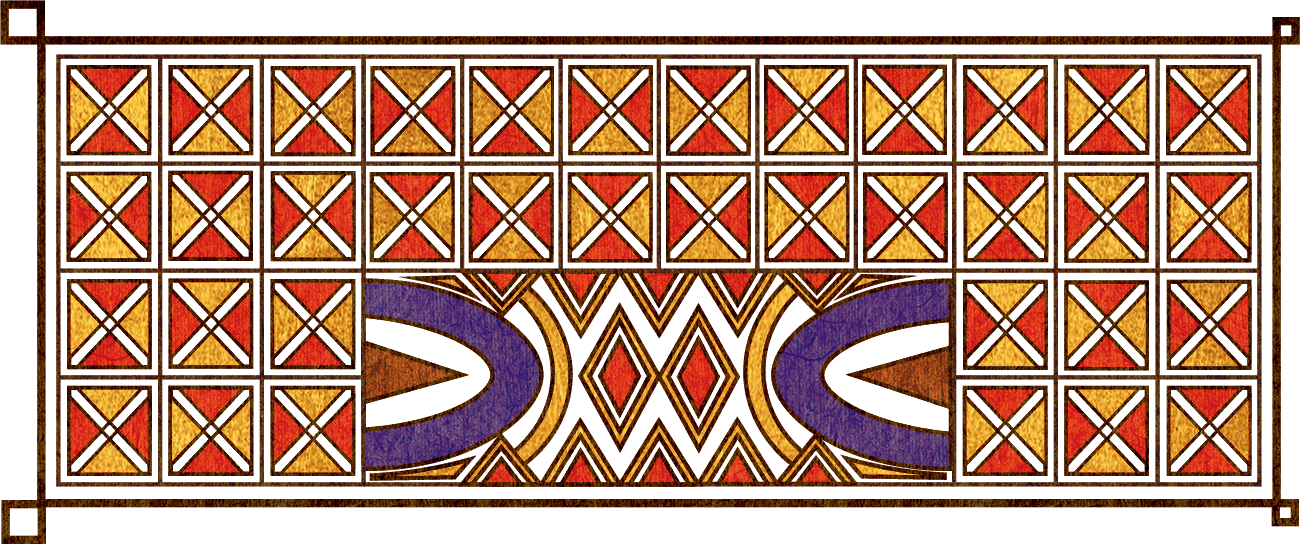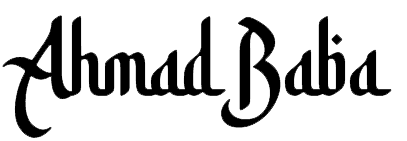السِّيرَةُ الذَّاتِيَّةُ
Biography
Ahmad Baba, full name
Abū al-Abbās Aḥmad ibn Aḥmad ibn Aḥmad ibn Umar ibn Muhammad Aqit al-Takrūrī Al-Massufi al-Timbuktī, was a 16th century scholar, teacher, jurist, and grammarian that studied and lived in modern-day Mali, particularly in the city of Timbuktu where he died. He wrote more than 70 works over his lifetime, from topics in law to politics, and had particular opinions on the topic of race and slavery. He witnessed the Moroccan invasion of Timbuktu, which vastly impacted the scholarly tradition for centuries.
Ahmad Baba was born on October 26, 1556 in the city of Araouane, to the Sanhaja Berber Aqit family. At an early age he moved to Timbuktu where he studied with his father and Mohammed Bagayogo, an esteemed scholar who came from the Djula Mandinka tribe. After the Moroccan invasion of the Songhai Empire in 1594, he was deported to Fez for accussations of sedition, where he remained until the death of the sultan Ahmad al-Mansur. In April 22 1608, in order of the successor Sultan, he arrived to Timbuktu where he would later die. It was said that the name "Muhammad" was inscribed in a birthmark in the upper part of his right arm, and he is mentioned in the famed book Tarikh al-Sudan as a great scholar.
Throughout his lifetime, he wrote several books and debated on multiple topics. One of the most influential books still studied in the modern day is his biography of Muhammad Abd al-Karim al-Maghili, a scholar who formed the basis of much religious law in the area. Teachers attempting to understand the West African understanding of ethnicity in the medieval period often turn to Ahmad Baba as well, who wrote much on the association of Black Africans and slavery, prevalent in African countries, as well as race overall.
It was quite hard for me to find a complete list of his works, let alone their texts themselves, however below are his known texts and links to the complete texts if provided:
- ad-Durru an-Nadeer Fi Kayfiyat as-Salaat `Ala as-Shafi` al-Basheer (The Rare Pearl on the Manner of Sending Prayers upon the Bringer of Good News)
- A pamplet of legal rulings on sending blessings to the prophet
- Waddi'
- A two volume commentary on the al-Mukhtasar written by Khalil ibn Ishaq al-Jundi
- Tanbeeh ‘l-Waaqif (Warning About the Free)
- A text about freeing captives and determining their status of freedom
- Khasasstu Niyat al-Haalif (Specifying the Intentions of the One Who Swears)
- A booklet regarding the legal judgements of taking an oath
- an-Naktu 'l-Wafiyya fi Sharh al-Alfiyya & an-Naktu az-Zakiyya (Sufficient Notes on Explaining the Alfiyya & The Intelligent Notes)
- Two texts commenting explanator remarks on the first and last parts of the al-Alfiyya, the last one unfinished.
- Nayl 'l-Amal fi Tafdeel an-Niyat 'Ala al-'Amal & Ghayat'l-Amal fi Tafdeel an-Niyat 'Ala al-'Amal (Attaining the Goal in Preferring Intention over Action & The Utmost Goal in Preferring Intention over Action)
- Two commentaries on the prophetic tradition: "The intention of the believer is more poignant than his actions."
- Ghayat al-Ijaadat fi Masaawat al-Faa'il Li'l-Mubtada fi Shart al-Ifaada & an-Naktu al-Mustajaadat fi Masaawatihim fi Shart al-Ifaadat (The Utmost in Aids Concerning the Equality of the Doer with the Mubtada’ in the Condition of Conveying Meaning & The Newly Requested Notes Concerning Their Equality in the Condition of Conveying Meaning)
- Two texts on Arabic grammar, three volumes total
- al-Tahdeeth wa 't-Ta'nees fi al-Ihtijaaj Bi Ibn Idrees (Renewal and Familiarity in the Argument by Ibn Idrees)
- Regarding the technical terminologies of Ibn Idrees in his Waraqaat.
- Jalab an-Ni'mat Bi Mujaanibat Awlaa 'd-Dhulamat (The Bringing of Blessing by Avoiding the Foremost Causes of Darkness)
- Two pamphlets on blessings
- Commentary on as-Sanuusi's Tarjumat
- Nayl al-Ibtihaaj bi ad-Dhayl 'Ala ad-Dibaaj (Attainment of Joy through the Supplement to the Dībāj)
- Continuation of al-Dībāj al-Mudhahhab
أحمد بابا، واسمه الكامل
أبو العبّاس أحمد بن أحمد بن أحمد بن عمر بن محمد أقّيت التكروري المصوفي التنبكتي، كان عالِمًا، ومعلّمًا، وفقيهًا، ونحويًّا في القرن السادس عشر الميلادي، درس وعاش في ما يُعرف اليوم بمالي، وخصوصًا في مدينة تنبكتو حيث تُوفِّي. ألّف أكثر من سبعين عملاً طوال حياته، شملت موضوعات في الفقه والسياسة، كما كانت له آراء خاصّة في مسألة العِرق والعبودية. وقد شهد الغزو المغربي لتنبكتو، الذي أثّر تأثيرًا بالغًا على التقاليد العلمية لقرون عديدة.
وُلِد أحمد بابا في ٢٦ أكتوبر ١٥٥٦ بمدينة أراوان، في أسرة أقّيت من صنهاجة البربر. وفي سنّ مبكرة انتقل إلى تنبكتو حيث درس على يد أبيه ومحمد بَغايوغو، وهو عالم جليل من قبيلة الدجُلا الماندنكية. وبعد الغزو المغربي لإمبراطورية السونغاي سنة ١٥٩٤، نُفي إلى فاس بتهمة العصيان، وظلّ هناك إلى حين وفاة السلطان أحمد المنصور. وفي ٢٢ أبريل ١٦٠٨، وبأمر السلطان الخليفة، عاد إلى تنبكتو حيث تُوفّي لاحقًا. وقد قيل إن اسم "محمد" كان منقوشًا على شامةٍ في أعلى ذراعه اليمنى، وقد ذُكر في كتاب
تاريخ السودان المشهور كعالِم كبير.
وخلال حياته ألّف العديد من الكتب وناقش موضوعات مختلفة. ومن أبرز كتبه التي لا تزال تُدرَس حتى اليوم سيرته عن محمد عبد الكريم المغيلي، وهو عالِم وضع أساس كثير من التشريعات الدينية في المنطقة. كما يرجع الأساتذة المهتمون بفهم مفهوم العِرق في غرب إفريقيا في العصور الوسطى إلى أحمد بابا، الذي كتب كثيرًا عن مسألة ارتباط الأفارقة السود بالعبودية، إضافةً إلى آرائه في مسألة العِرق بوجه عام.
كان من الصعب عليَّ أن أجد قائمة كاملة بمؤلفاته، فضلًا عن نصوصها، غير أن ما يلي هو أشهر أعماله المعروفة، مع روابط للنصوص الكاملة إن وُجدت:
- الدُّرُّ النَّدِير في كيفيّة الصَّلاة على الشَّفيع البَشير
- رسالة فقهية في أحكام الصلاة على النبي ﷺ
- وَدِيع
- شرح في مجلّدين على المختصر تأليف خليل بن إسحاق الجُندي
- تنبيه الواقِف
- كتاب في تحرير الأسرى وتعيين أحكام حريّتهم
- خصَّصتُ نيّة الحالِف
- رسالة في الأحكام الفقهية لليمين
- النُّكَت الوافية في شرح الألفيّة & النُّكَت الزَّكيّة
- كتابان من الملاحظات التفسيرية على أول وآخر الألفيّة، والآخر غير مكتمل
- نيل الأمل في تفضيل النيّة على العمل & غاية الأمل في تفضيل النيّة على العمل
- شرحان على الحديث النبوي: "نيّة المؤمن خير من عمله"
- غاية الإعادات في مساواة الفاعل للمبتدأ في شرط الإفادة & النُّكَت المستجدّات في مساواتهم في شرط الإفادة
- كتابان في النحو العربي، في ثلاثة مجلّدات
- التحديث والتأنيس في الاحتجاج بابن إدريس
- حول المصطلحات التقنية لابن إدريس في الورقات
- جلب النِّعمة بمجانبة أولى الظُّلُمات
- رسالتان في النِّعم والبركات
- شرح على تراجم السَّنوسي
- ثلاثة مجلّدات
- نيل الابتهاج بالذيل على الديباج
- تتمّة لكتاب الديباج المُذهَّب





